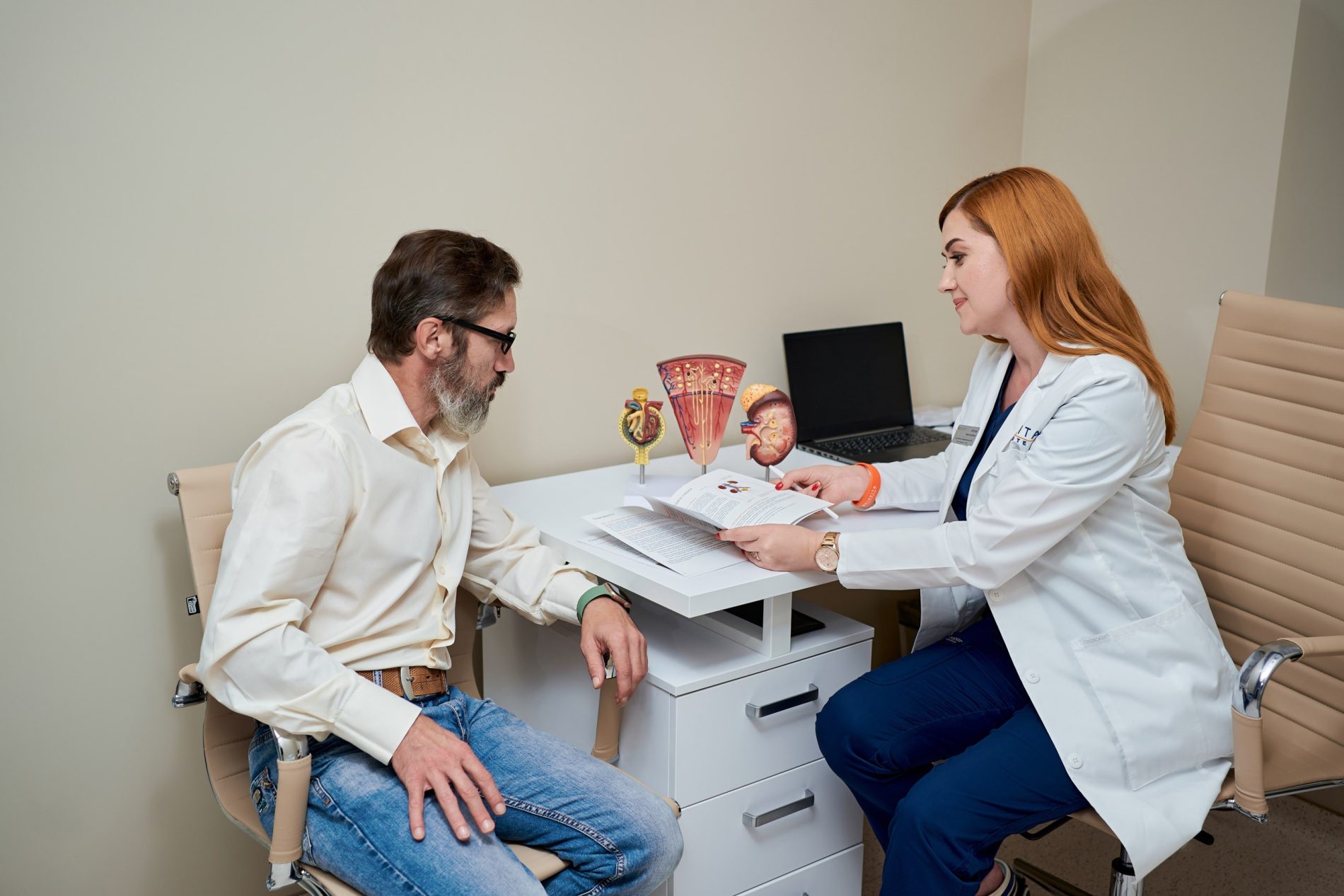
Nephrologist in Kyiv
Nephrologist – modern prevention, diagnostics and treatment of the kidneys and urinary system in KyivНайчастіше уваги нефролога потребують такі стани, як пієлонефрит (запалення нирок) та гломерулонефрит, а основні скарги – коли болять нирки, або змінюється колір чи кількість сечі. Нефрологія вивчає методи діагностики сечової системи та медикаментозного лікування нирок, а також замісної ниркової терапії – діаліз та його методики (гемодіаліз, перитонеальний діаліз). У Diavita Institute ( Київ ), ми поєднуємо науковий підхід, інноваційне обладнання та делікатну підтримку пацієнта на всіх етапах лікування.
In modern society, kidney diseases have reached the level of a pandemic: every seventh inhabitant of our planet has kidney pathology. However, most of them do not even know about the presence of the disease, because in the initial stages, kidney failure has an asymptomatic course. That is, the kidneys do not hurt when they lose their function, and chronic kidney disease (CKD) develops imperceptibly. Sometimes only a high level of creatinine during a routine examination indicates the need for treatment in a nephrology center.
Therefore, it is extremely important to pay attention to the health of the kidneys, to undergo regular preventive examinations (check-up), and if necessary, do not delay and contact Diavita Institute nephrologists, who perform kidney diagnostics and treatment.
Leading experts - nephrologists of the Institute in Kyiv will be able to check the kidneys, assess their condition and functioning, and carry out optimal treatment of the kidneys with an individual selection of methods.
Показання для звернення до нефролога
-
Постійна втома, набряки обличчя чи кінцівок
-
Зміни в сечових функціях: колір, пінистість, кількість
-
Часте або болюче сечовипускання, особливо вночі
-
Біль у попереку, підвищена температура
- Підвищення артеріального тиску, сухість шкіри, свербіж
-
Зростання креатиніну, сечовини, зменшення швидкості клубочкової фільтрації
-
Наявність пієлонефриту, гломерулонефриту, полікістозу нирок або діабетичної нефропатії
Як проходить діагностика у нефролога
-
Первинна консультація нефролога: збір анамнезу, обговорення скарг, огляд
-
Laboratory tests: визначення креатиніну, електролітів, білка у сечі, ШКФ та інших показників
-
Інструментальна діагностика: ультразвукове обстеження нирок, доплер, за потреби — біопсія
-
Чек-ап-програми: регулярні профілактичні огляди
Diseases and conditions treated by our expert nephrologists:
- glomerulonephritis (acute, chronic);
- urinary tract infections (pyelonephritis, cystitis, etc.);
- polycystic kidney disease, kidney cysts;
- diabetic nephropathy;
- hypertensive nephropathy;
- gouty nephropathy;
- urolithiasis;
- hereditary and congenital nephropathies;
- chronic kidney disease;
- acute kidney damage;
- management of pregnant women with renal pathology;
- nephropathy in systemic diseases.
The multidisciplinary approach of our highly qualified specialists allows us to provide a full range of medical care to patients with diseases of the urinary system, which meets international standards. To carry out a comprehensive examination of the condition of the kidneys, to carry out complex prevention of chronic kidney disease, to carry out kidney treatment, including the methods of peritoneal dialysis and hemodialysis - all this is possible at the expert level at the Diavita Institute.
Kidney problem (kidney disease or loss of kidney function) can be suspected in the presence of the following complaints (or changes in the results of examinations):
- general weakness, fatigue;
- swelling of the lower limbs, face;
- changes in the color and transparency of urine;
- increased blood pressure;
- urination disorders: frequent, nocturnal, painful urination;
- increase in body temperature;
- lower back pain;
- nausea;
- skin itching;
- pallor of the skin;
- deterioration of sleep;
- the presence of cysts, concretions (stones), changes in the size and structure of the kidneys;
- changes in urine analysis: the presence of protein, erythrocytes, leukocytes, cylinders, bacteria;
- increase in the level of creatinine, urea, uric acid, potassium, phosphorus;
- decrease in blood hemoglobin level.
For timely detection of kidney pathology, we recommend annual scheduled examinations - check-ups, information about which you can find in Package offers.
In the Expert dialysis Centers of our Institute, patients with chronic kidney disease stage 5 (CKD stage 5) can receive free medical treatment (dialysis in Kyiv) under the following packages:
Treatment of patients by hemodialysis (HD) in outpatient settings. Usually, dialysis is performed by hemodialysis.
Treatment of patients by the method of peritoneal dialysis in outpatient settings — peritoneal dialysis is continuous ambulatory peritoneal dialysis (CAPD) and automated peritoneal dialysis (APD)
In order to receive the most productive consultation, we offer several tips:
- take the results of lab tests and other medical examinations with you;
- draft a list of symptoms and complaints, as well as medicines and drugs that you take on a regular basis;
- if you plan to undergo additional examinations, arrive to clinic after 8-10 hours fasing;
- if available, take your medical documentation with you (excerpts, examination results, conclusions of other specialists);
- think and prepare a list of questions that you want to discuss with the doctor and get answers.
Chronic kidney disease (CKD) is a disease that lasts more than 3 months and is accompanied by deterioration of kidney function.
The causes of the development of CKD are quite diverse: diabetes, hypertension, glomerulonephritis, rheumatological diseases, and others. But whatever the reason for the development of CKD, the process of loss of kidney function is always accompanied by the death of the structural parts of the kidney - nephrons.
Most people do not experience symptoms of CKD, but they may gradually develop:
- increased fatigue and general weakness;
- deterioration of appetite, nausea;
- difficulty concentrating, memory problems;
- swelling of the lower or upper extremities (especially in the morning);
- swelling around the eyes, swelling of the face (especially in the morning);
- dry and itchy skin;
- frequent urges to urinate, especially at night.
In the absence of adequate treatment and monitoring of CKD, rapid progression of the disease may occur, leading to the need for treatment with dialysis techniques or kidney transplantation.
- people diagnosed with diabetes;
- people with high blood pressure;
- people who have relatives in the family who have CKD;
- people with urolithiasis;
- people with gout and other rheumatological diseases;
- people with congenital kidney abnormalities;
- people with polycystic kidney disease;
- overweight people;
- elderly persons over 60 years old;
- patients who have suffered acute kidney injury;
- patients with oncological diseases receiving chemotherapy;
- patients with frequent exacerbations of chronic tonsillitis
If you understand that you are in a high-risk group, you should contact a nephrologist for examinations:
- urine analysis to determine the content of microalbumin (protein is an important component of the body, so normally the kidneys retain all the filtered protein in the body. When the kidneys are damaged, different amounts of protein can enter the urine, which is an early sign of kidney damage);
- biochemical blood analysis to determine the level of creatinine - a product of the body's vital activity, which is formed during muscle work. The level of creatinine in the blood is quite stable, but its concentration in the blood can increase when the kidneys are damaged. Glomerular filtration rate (GFR) is calculated based on blood creatinine level;
- blood pressure measurement.
Yes, you can. For this, you need to follow several rules:
- undergo regular preventive examinations at your family doctor;
- control the level of blood pressure;
- normalize body weight;
- regularly perform physical exercises;
- adhere to the recommended diet with restriction of salt and animal protein;
- minimize the use of alcoholic beverages;
- give up smoking;
- according to the doctor's prescription, in the presence of diabetes or arterial hypertension, constantly take drugs.
Nephrology is our profile, our area of expertise. The clinic is equipped with the most modern high-precision diagnostic equipment of leading manufacturers. We provide comprehensive treatment of diseases of the kidneys and genitourinary system based on protocols and modern practices, because our experts not only regularly participate in world professional congresses and conferences, but also report, teach and share experience.







